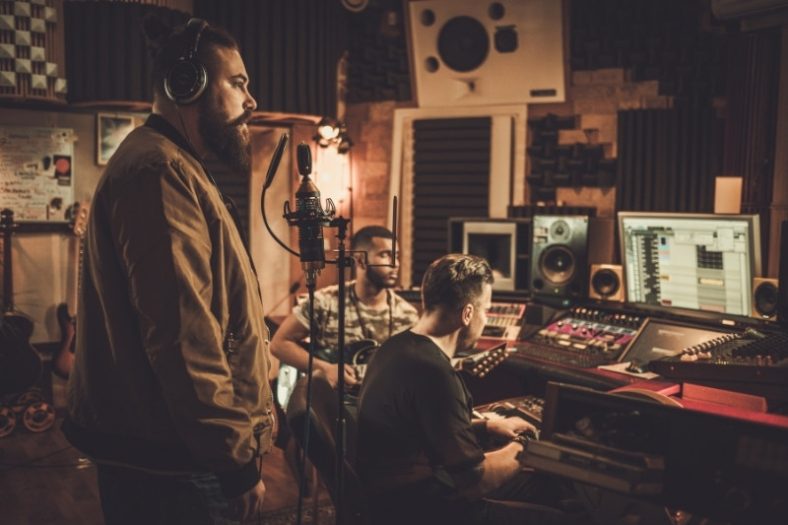How to Start a Band the Right Way

For anyone new to the idea of starting a band, it can be a pretty daunting task. From getting the right people and finding your sound, to arranging gigs, rehearsals, and managing everything, it can be pretty hard to know where to start.
Playing a musical instrument is a great and fulfilling hobby, but it can get even better if you play with other musicians. The most logical way to do that is to join or start a band. Your strategy will depend on your own playing experience and the goal you want to accomplish.
Some people will play just for fun and relaxed gigs, while others will have bigger plans. In this article, we’re going to share some tips on starting a cover band with gig-centered ambitions.
Contents
1. Gather team players

If you’re a music enthusiast, you must have read dozens of articles about cult bands that have been dismembered because of irreconcilable artistic differences. In other words, the members were either too vain or too proud to continue working together.
This is something you should avoid at all costs in your band. It’s important to gather team players, rather than have superstars who will ruin the atmosphere in the band.
Because of that, it would be wise to accept members who might be less skillful with their instruments, but true team players. Of course, this doesn’t mean that you should form a band with bad musicians.
It only means that you should conduct a thorough audition and test a large number of musicians. Once you’ve selected only the best players among them should you handpick the one(s) with more positive personality traits.
2. Find your sound
The band’s sound is probably the most important. Finding your sound is crucial in the beginning. It’s also detrimental that all band members agree on that sound. It could get messy if someone doesn’t like that particular genre or sound during the long haul.
The place to start would be with your “influences”. If you and your band members have similar influences then it shouldn’t take long to find your sound. If not, then some middle ground needs to be found, as you are all a team.
Afterward, when you have your sound, just jam a bit, see where it takes you. Chemistry will play a huge part here, as a newly formed band can be uptight at first but don’t worry, it will get better and smoother as time passes.
If you are a fully-fledged band, meaning you have a singer on board too, then make sure his/her vocals can that particular genre. It’s good to know this from the start, as instruments can be played with almost any genre, but the vocals are centered and can withstand only a few, depending on the singer.
3. Continuous rehearsals
Playing live gigs is imperative for every band to gain experience and, even more important, to become self-confident.
But your newly started band must have regular rehearsals. Their pace and duration will depend on your aspirations and skills. On average, you should meet at least twice a week and spend some 2-3 hours rehearsing in a studio. This regular practice will help you meet all the band members more thoroughly.
What might be an obstacle for regular practice sessions is the rehearsal space. The most logical thing to do would be to book a studio for your weekly practice, but every such session costs a certain amount of money. Although it most probably won’t cost you an arm and a leg, some of the members might not be willing to pay for something they do just for fun.
That’s why it’s clever to inform your best candidates during the auditions that you’re planning to book a studio for regular practice sessions. By doing so, they’ll know in advance whether they should join your band.
Another solution is to start with home rehearsals. In that case, it’s advisable to keep the noise down, so you could use some electronic drums and an acoustic guitar, as well as a bass guitar of the same sort. This choice of instruments will reduce the level of noise your band is going to produce during homes practice sessions.
4. Assign the frontman

Every band is a group of equals, but one of you should be more equal than the others. In other words, one member of your music group needs to be the frontman of the band. This person will be responsible for communication with the audience, gig negotiations, and public relations in general.
Since the entire article is focused on a cover band, we can assume that you won’t have any large PR needs. Whatever these communication demands might be, it’s good for the entire band if one member is in charge of that part of the work.
What’s more, one of you should handle the social media posts. Today you can win numerous fans and appreciators if you use social media to promote your band efficiently. Of course, other band members can give their contributions to the band’s social media accounts by taking original photos, taking videos, etc.
Since cover bands usually don’t have roadies or agents, band members need to agree on the communication terms. Assigning the main communicator, i.e. the frontman will help you become easily recognizable to your fans.
5. Name the treasurer
Most bands fall apart when they reach commercial success. While you can’t predict with certainty what will happen with your band in that case, you can at least take some measures in advance to reduce the number of potential issues.
To start with, you need to name the band’s treasurer. It sounds so friendly and romantic that you can all take care of the band’s finances, but that’s not the case in reality. One of the band members should take the responsibility for that part.
The extent of that responsibility will depend on your musical and professional goals. If you just want to have fun and play low-budget gigs, then you’ll probably settle the financial terms immediately after each gig.
But if your band starts playing larger gigs, the amount of money you receive might become too large to be handed to you in cash. In that case, you’ll also have to pay some taxes. At this point, the treasurer should either read these taxation rules on the website of the Musician’s Union, as well as contact an experienced accountant.
Additionally, it would be smart not to direct all the earned assets on your personal earnings, but to put a certain percentage aside for various accessories for your band. These funds can be used to improve your equipment, buy additions for your instruments, or simply to save them for any other investments of the band.
6. Pick the right name
Forming a new band should include the process of picking the right name for it. Even if you’re planning only to start a cover band, it’s good to have a cool name. You can never tell if the muses of musical creation will visit you one morning and inspire you to make your own original music.
So, if you’re planning to found a rock cover band, a plural name is the most logical option. This is a very long tradition that dates back to the 1950s. If you’ve decided to embody the entire band in your frontman, you could add his name to the band name, like Derek and The Dominoes.
While many different paths can lead you to the perfect name for your band, we have to mention the most logical one – have a look at the coolest band names and make an original combo of words. Alternatively, these names could inspire you to come up with something completely genuine.
When you choose your name, don’t forget to trademark that band name. As you legally protect it, you prevent other bands from stealing your precious brainchild. Also, in case somebody else somewhere in the world has named their name the same way, you can rest assured that you’re protected by law.
7. Start recording

The final step towards your musical journey is to start recording some demos. After all the rehearsals and band obligations, the time to move forward has come.
Keep in mind that things can still go south for any band, as the recording process means that you will spend hours together on a daily basis, trying to get everything right, meaning that problems can still occur when you are stuck in the studio together.
But this is nothing to be afraid of, arguments will arise no matter what, those that go through them unscathed are the ones that can make it. A healthy band is not a band that doesn’t fight, but a band that can work things out and moves forward.
The recording process can be fun. When you have all your things together, recording your songs and publishing them is the first step towards your music career. Your best bet is to find a music producer in town and get to work because all else falls short if you don’t take that first step forward. After you’ve successfully done this, just go with the flow and see where it takes you.
Conclusion
Forming a band takes a lot of practice and patience, but it is an incredibly rewarding experience as well. From the first collaborative rehearsal to your first gig at the local bar, every step should be treated as if it’s an achievement because you’ve put in the effort for this to happen. Practice, don’t talk; play, not fool around. And if everything goes smoothly, you’ll be playing bigger venues before you even notice.
Just take your time to enjoy the process and give it everything you’ve got because if you let opportunities slip by due to lack of effort, there will always be someone better than you that will grab them instead. So don’t fool around with the band, just rehearse hard and take it seriously, or eventually, somebody else will do that for you.
Keep in mind that nothing is set in stone, so if you’ve been rejected from a few auditions or people have passed on the dotted line to form their bands, life will keep going. You can take it as a lesson learned and try again until you succeed.
Remember that this business is just like any other – if you’re not enjoying what you’re doing, doing the same thing every day won’t bring you anything in return. So relax and enjoy yourself, play your favorite music to the best of your abilities.





